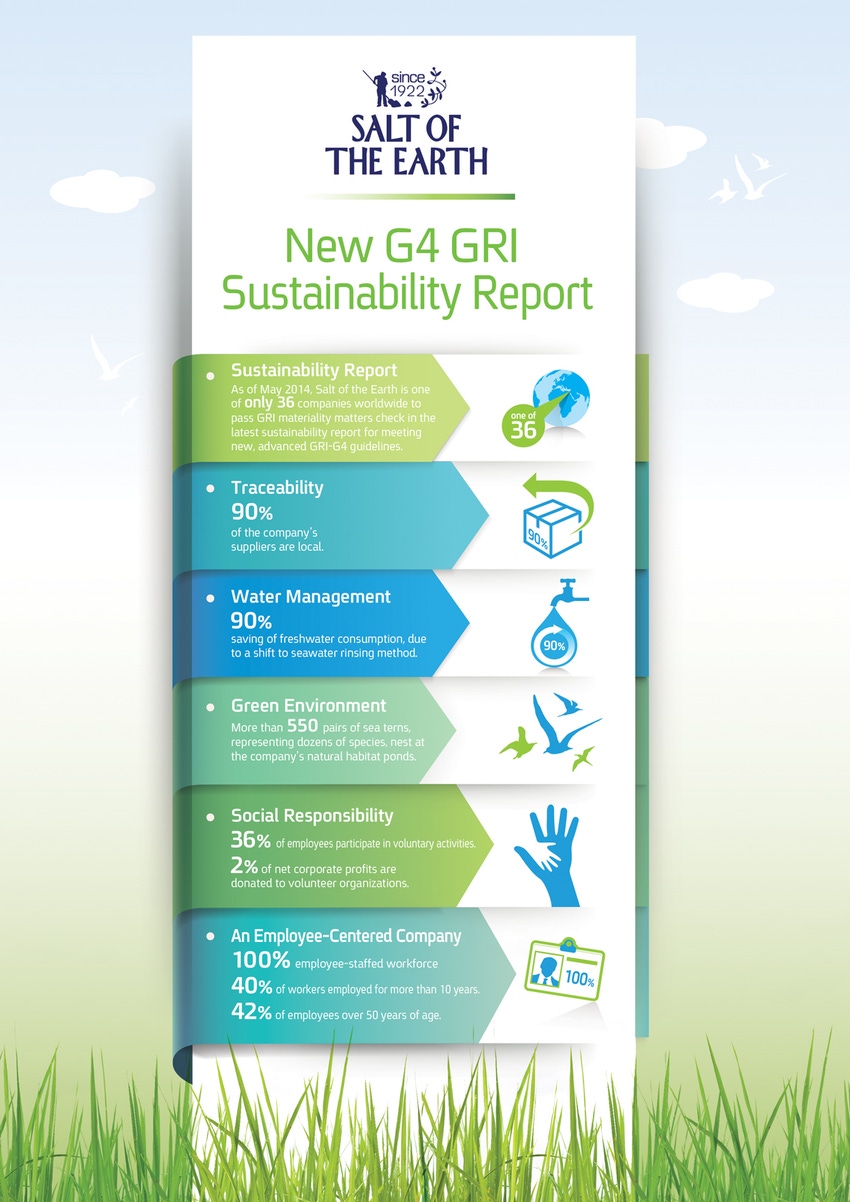Salt of the Earth is one of only 36 companies worldwide—and the first Israeli company—to meet GRI-G4 sustainability reporting materiality requirements.
September 8, 2014

As of May 2014, Salt of the Earth is one of only 36 companies worldwide—and the first Israeli company—to pass GRI materiality matters check in the latest sustainability report for meeting new, advanced GRI-G4 guidelines. The report is based on 2013 performance data.
“Sustainability is an integral part of the Salt of the Earth DNA. From the beginning, the company has taken steps to find the perfect balance between production, society and environment,” says Dovik Tal, CEO for Salt of the Earth. “We are committed to sustainable strategy in every aspect, starting by sourcing high purity sea salt products and taking care of the environment. We are developing a cutting-edge sustainable growth company focused on innovation, pure and high-value products, all with minimal ecological impact.
The GRI report covers a wide range of sustainable topics, including: environment, minimum ecological impact, wild life preservation, natural processing, water waste management, product innovation, employee training/development and community investment.
Salt of the Earth uses Mother Nature’s resources to produce pure sea salt from the Red Sea and Dead Sea by evaporating the salt in pond system near the sea. This natural processing ensures three main sustainable benefits:
Waste not, want not of water management—saving 90 percent of fresh water consumption, due to the company’s shifting to salt rinsing with sea water. It Supports the US EPA “reuse, reduce, recycle” philosophy.
Minimum ecological footprint by implementing responsible management and take care of next generation’s green environment. For example, preserving the balance of marine life forms around the pipelines, preserving biodiversity and promoting educational dialogue on environmental preservation issues including wild life preserve.
Collaboration with environmental and bird watching organizations—in two main company sites, Eilat (at Eilat Bird-Watching Park) and Atlit, birdwatchers are able to watch hundreds of types of birds . In partnership with the Society for the Protection of Nature in Israel and the Nature and Parks Authority in Eilat, the company utilized the ponds and created a beautiful site for birds that attracts thousands of migrating birds.
Innovation—developing innovative products for well-being, including low-sodium products, sodium-reduction ingredients and an advanced product line for convenience and gourmet niches.
Social responsibility—Salt of the Earth acts according to the principles of sustainability and social responsibility, including continually training and developing its employees, encouraging them to volunteer and help the elderly and schoolchildren. One of its core values is to employ Jews, Arabs and Christians.
“As a productive and innovative company, we believe sustainability is the right approach for responsible management, while minimizing negative impacts and promoting the positive values we share with parties around us, near and far,” adds Tal.
Salt of the Earth is a grass-roots company constantly innovating. It strives to create an industry that proves beneficial to humankind, community and the environment, and yields constant proceeds for its owners and employees.
Visit us at SIAL, Paris, Hall 4, stand #M020.

You May Also Like


